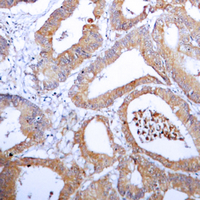
IHC-P analysis of formalin fixed human colon cancer tissue section using GTX54911 AKR1B1 antibody. Antigen retrieval : Heat mediated antigen retrieval with sodium citrate buffer (pH 6.0)
AKR1B1 antibody
GTX54911
ApplicationsImmunoFluorescence, Western Blot, ImmunoCytoChemistry, ImmunoHistoChemistry, ImmunoHistoChemistry Paraffin
Product group Antibodies
ReactivityHuman, Mouse, Rat
TargetAKR1B1
Overview
- SupplierGeneTex
- Product NameAKR1B1 antibody
- Delivery Days Customer9
- Application Supplier NoteWB: 1:500 - 1:1000. ICC/IF: 1:100 - 1:500. IHC-P: 1:100 - 1:200. *Optimal dilutions/concentrations should be determined by the researcher.Not tested in other applications.
- ApplicationsImmunoFluorescence, Western Blot, ImmunoCytoChemistry, ImmunoHistoChemistry, ImmunoHistoChemistry Paraffin
- CertificationResearch Use Only
- ClonalityPolyclonal
- ConjugateUnconjugated
- Gene ID231
- Target nameAKR1B1
- Target descriptionaldo-keto reductase family 1 member B
- Target synonymsADR, ALDR1, ALR2, AR, aldo-keto reductase family 1 member B1, Lii5-2 CTCL tumor antigen, aldehyde reductase 1, aldose reductase, low Km aldose reductase
- HostRabbit
- IsotypeIgG
- Protein IDP15121
- Protein NameAldo-keto reductase family 1 member B1
- Scientific DescriptionThis gene encodes a member of the aldo/keto reductase superfamily, which consists of more than 40 known enzymes and proteins. This member catalyzes the reduction of a number of aldehydes, including the aldehyde form of glucose, and is thereby implicated in the development of diabetic complications by catalyzing the reduction of glucose to sorbitol. Multiple pseudogenes have been identified for this gene. The nomenclature system used by the HUGO Gene Nomenclature Committee to define human aldo-keto reductase family members is known to differ from that used by the Mouse Genome Informatics database. [provided by RefSeq, Feb 2009]
- ReactivityHuman, Mouse, Rat
- Storage Instruction-20°C or -80°C,2°C to 8°C
- UNSPSC41116161

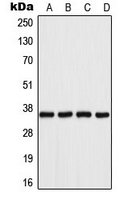
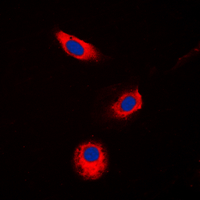
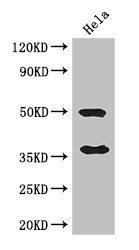
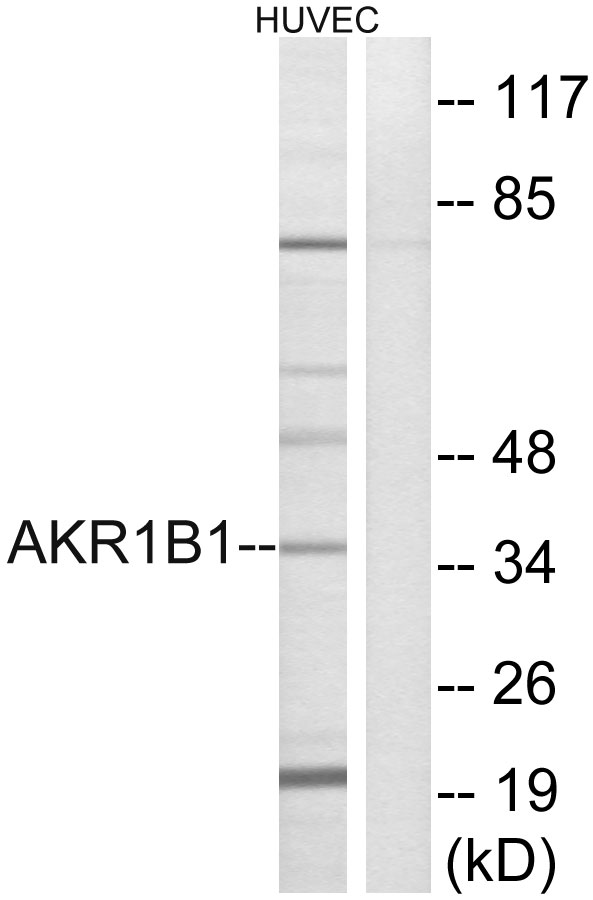



![Various whole cell extracts (30 μg) were separated by 10% SDS-PAGE, and the membrane was blotted with AKR1B1 antibody [N1C3] (GTX113381) diluted at 1:1000. The HRP-conjugated anti-rabbit IgG antibody (GTX213110-01) was used to detect the primary antibody. Corresponding RNA expression data for the same cell lines are based on Human Protein Atlas program.](https://www.genetex.com/upload/website/prouct_img/normal/GTX113381/GTX113381_43936_20200501_WB_TPM_watermark_w_23060501_162.webp)